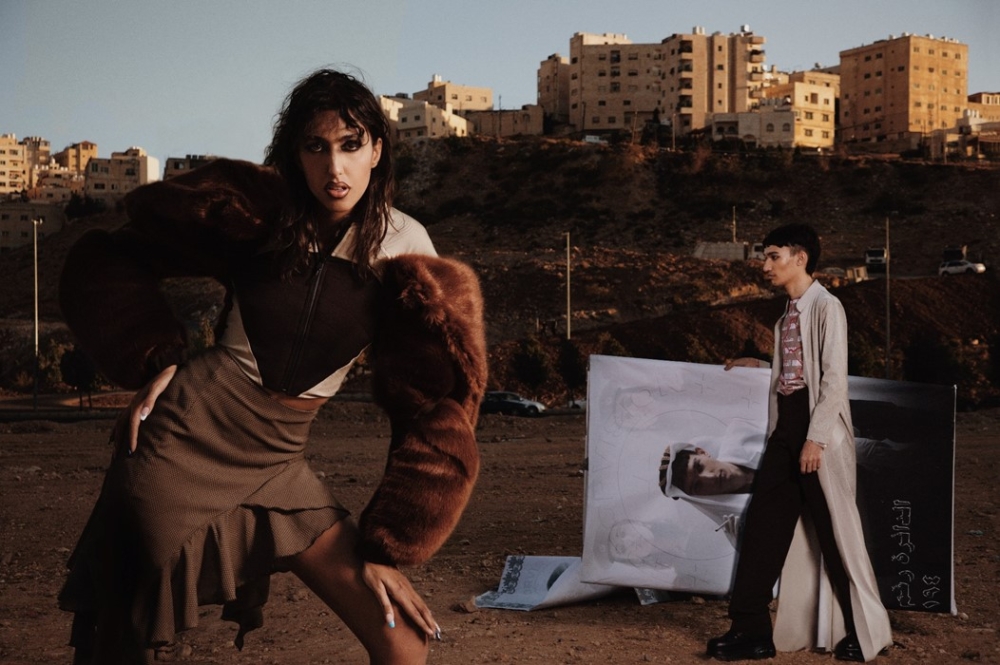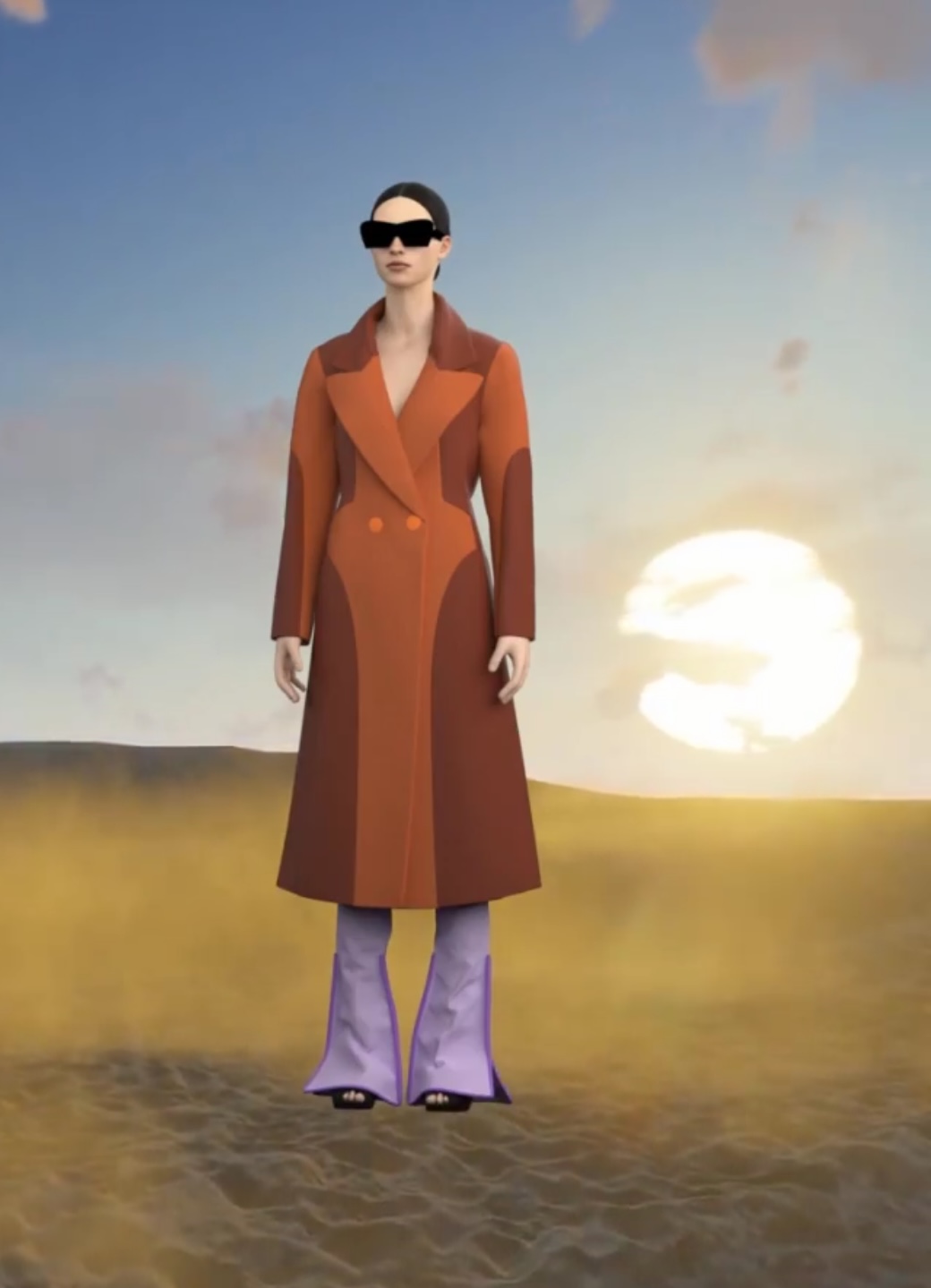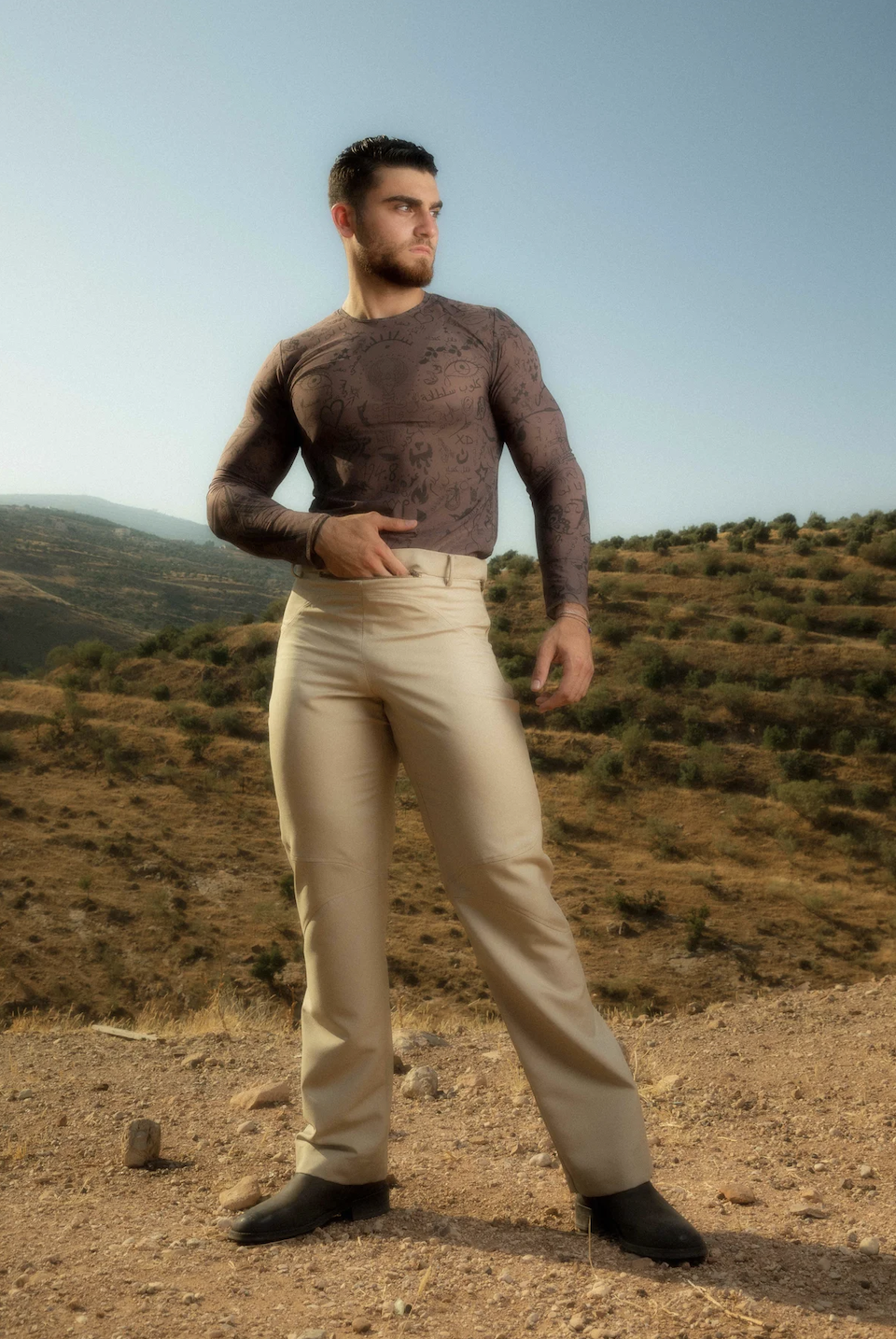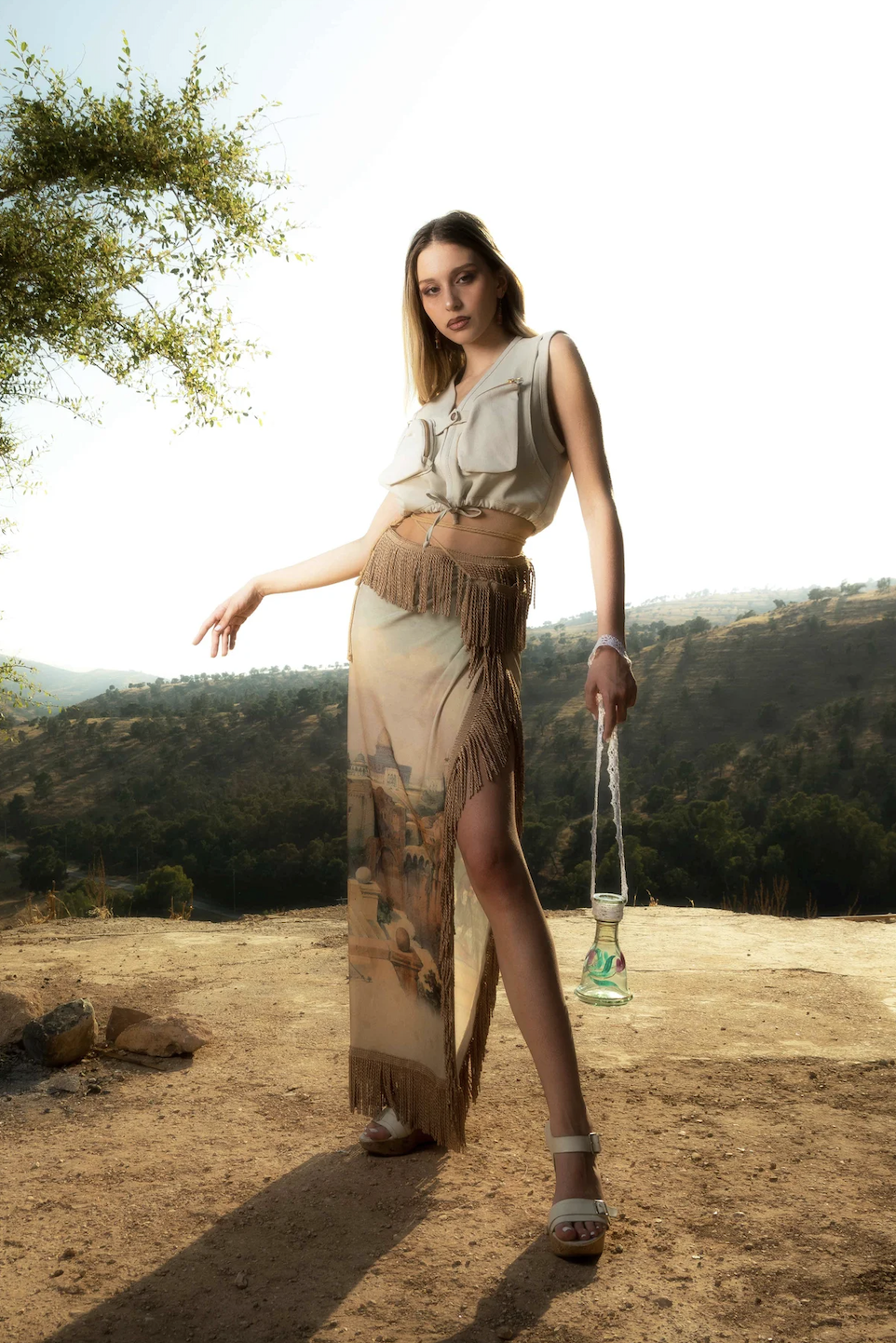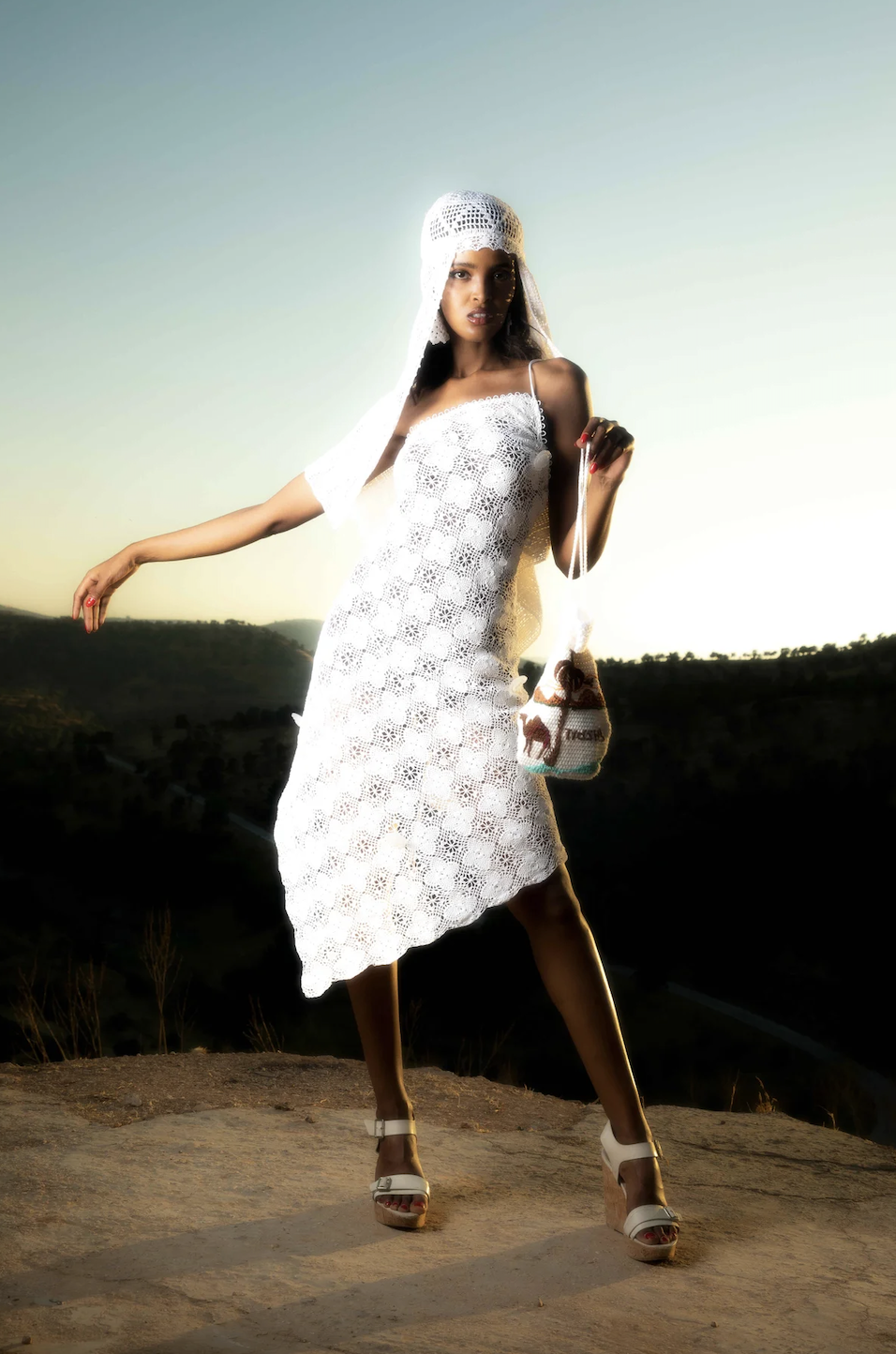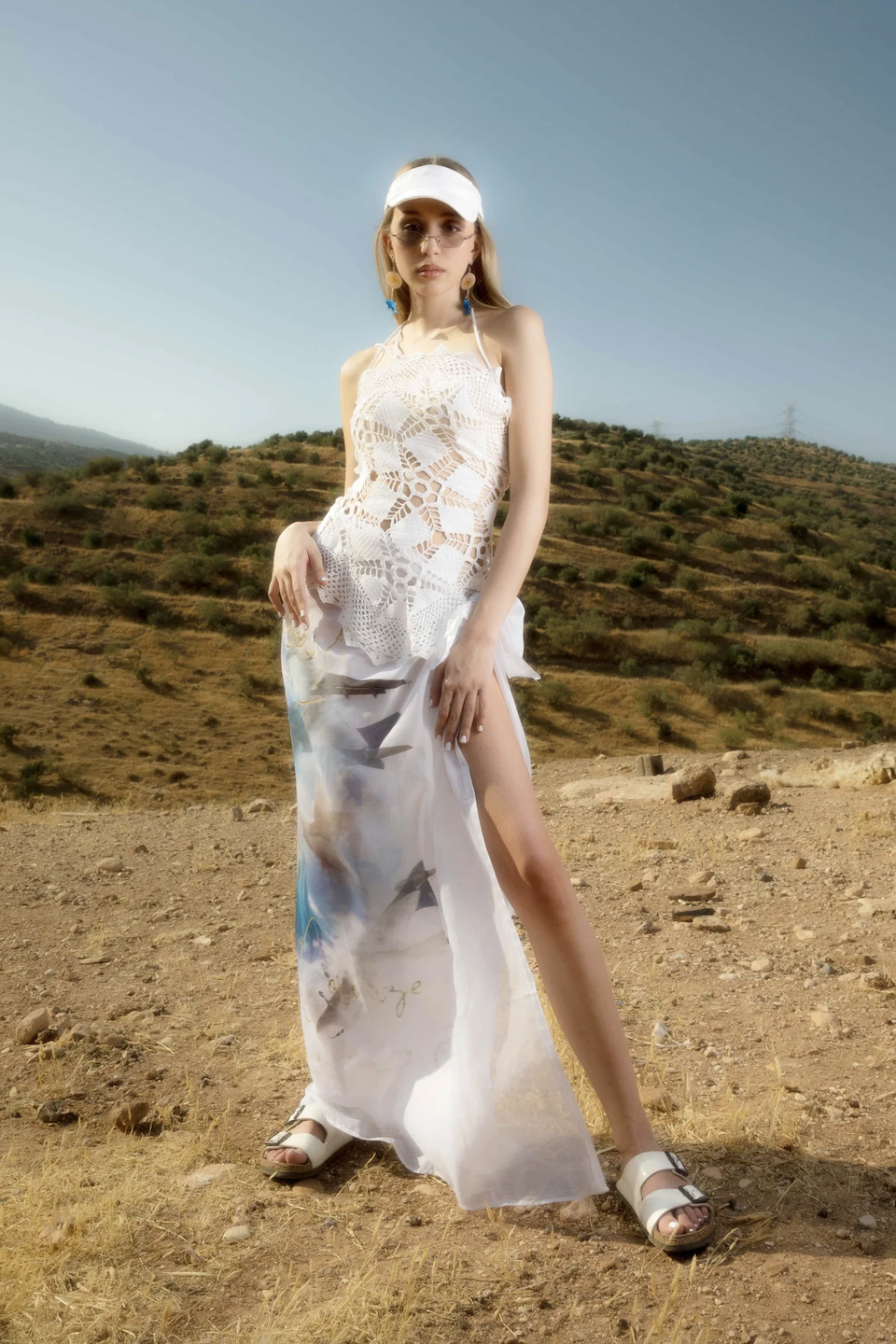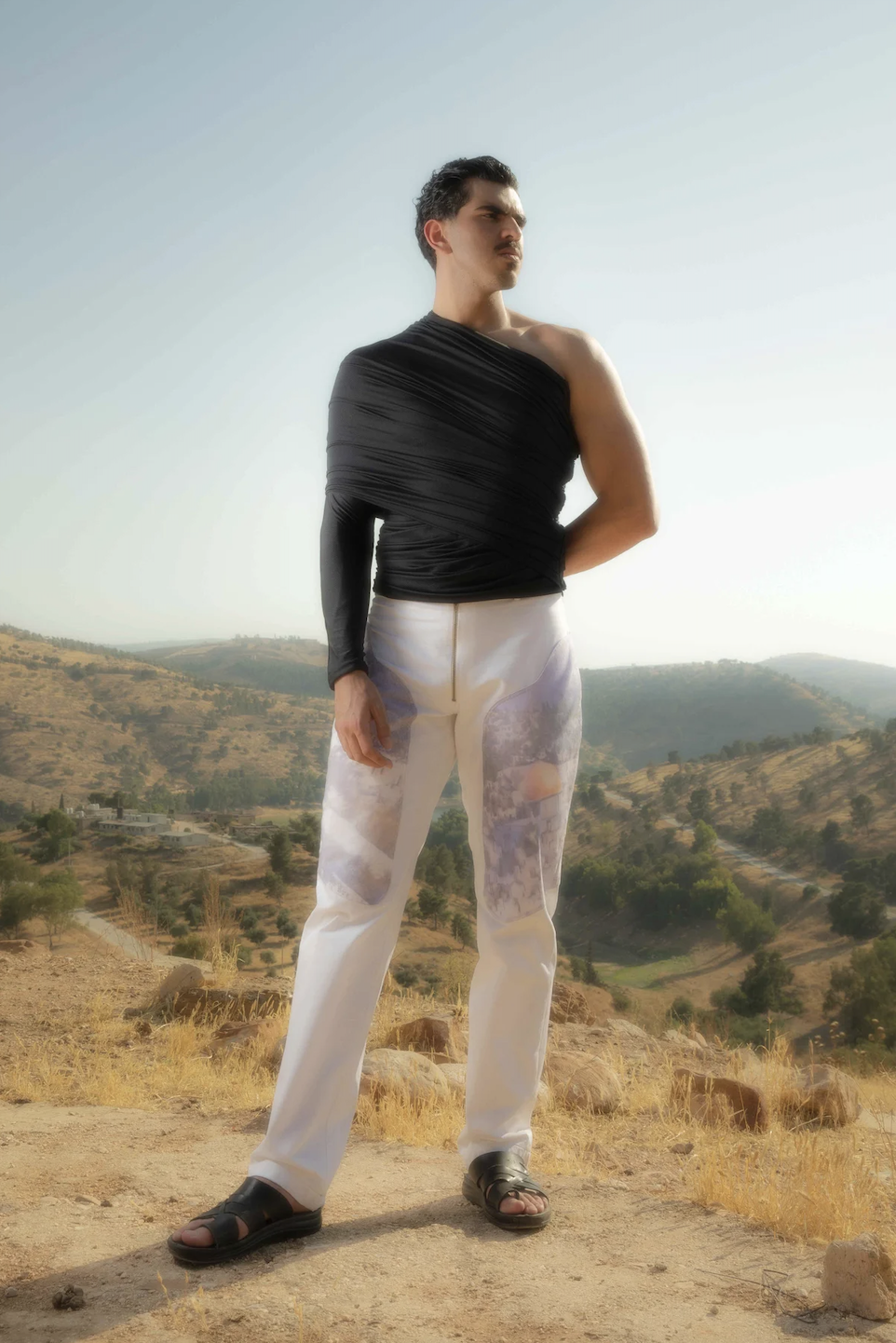Trashing Clothing, an LGBT Ready-to-Wear Palestinian fashion brand was founded with a unique fusion of political satire, provocativeness, kitsch culture, and wit. The brand, whose work conveys both beauty and agony, aims to represent the Palestinian Peoples capacity to endure adversity. In exploring and playing with the concept of what is deemed “cheap” or “trashy” in contemporary society, the brand provides an enduring view of Arab and Palestinian identity in the face of westernization. The name was chosen to represent having to start from “ground zero”.
The company produces collections that cut through boundaries of race, gender, and nationality and utilizes fashion as a tool to educate and provoke thought under the co-creative management of Omar Braika and Shukri Lawrence, based in Palestine and Jordan. Each collection addresses a subject in the spirit of anti-fashion by making references to workwear, clubwear, sportswear, Arab pop idols, and eveningwear.
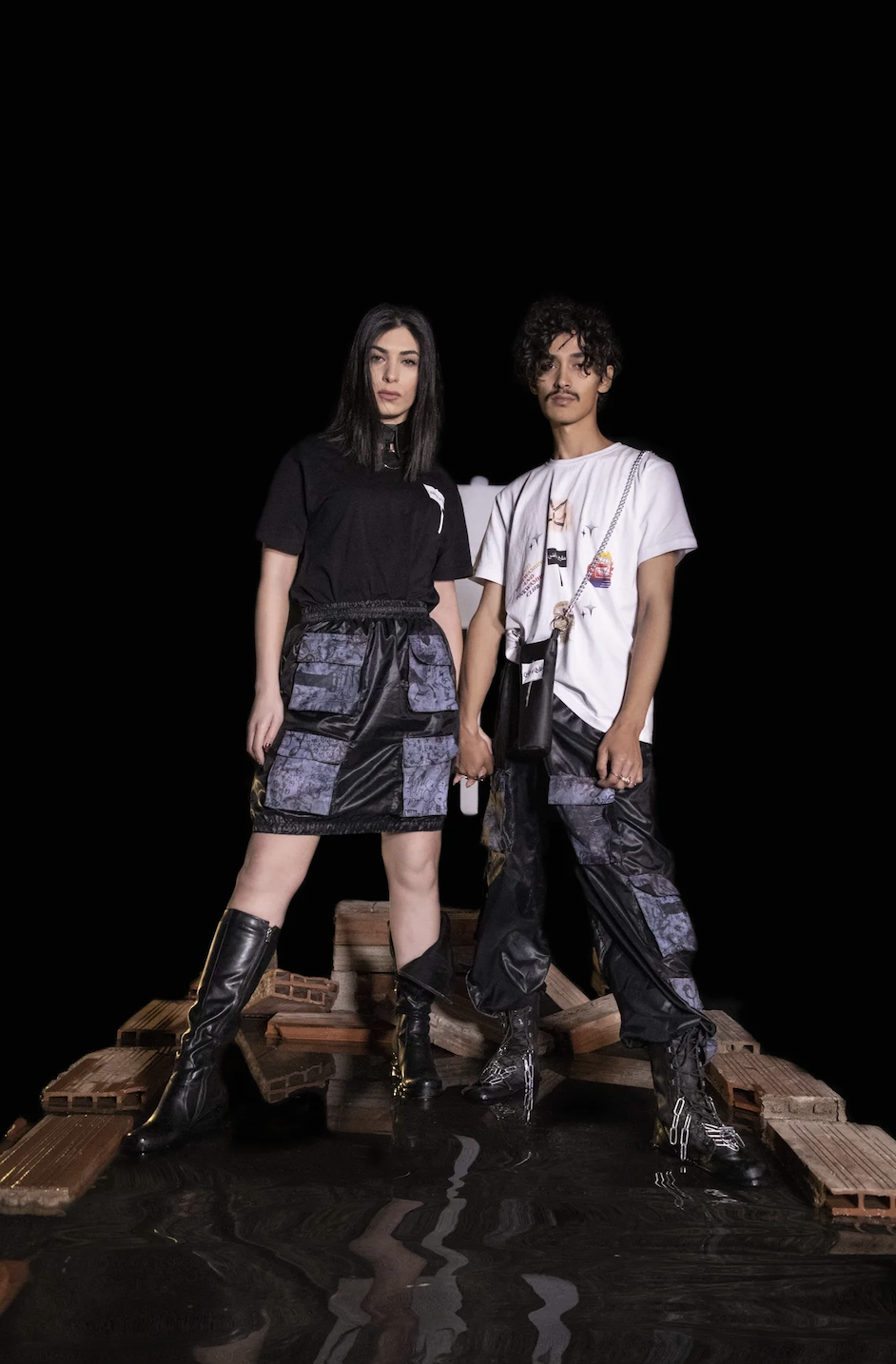
“Trashy didn’t come from a specific moment,” says Lawrence. “It was a process of looking at the industry in the region. We felt that there were a lot of rules and traditions that can hold you back. So much so that we needed something coming from our part of the world that was almost an anti-fashion movement. We would take the traditional tools but use them to create our own message.”
“Take the name, for example. No design wants to be called trashy, but we’re reclaiming the word – that’s a statement on its own. We’re trying to showcase our country’s fashion. Not in a traditional sense, but as who we are now. This fashion is coming completely from a Palestinian perspective.”
Contradictions, education, and encouraging customers to purchase items for their stories as well as their aesthetic appeal are all major themes of Trashy. The brand also makes an effort to minimize waste and increase efficiency in the production of its garments.
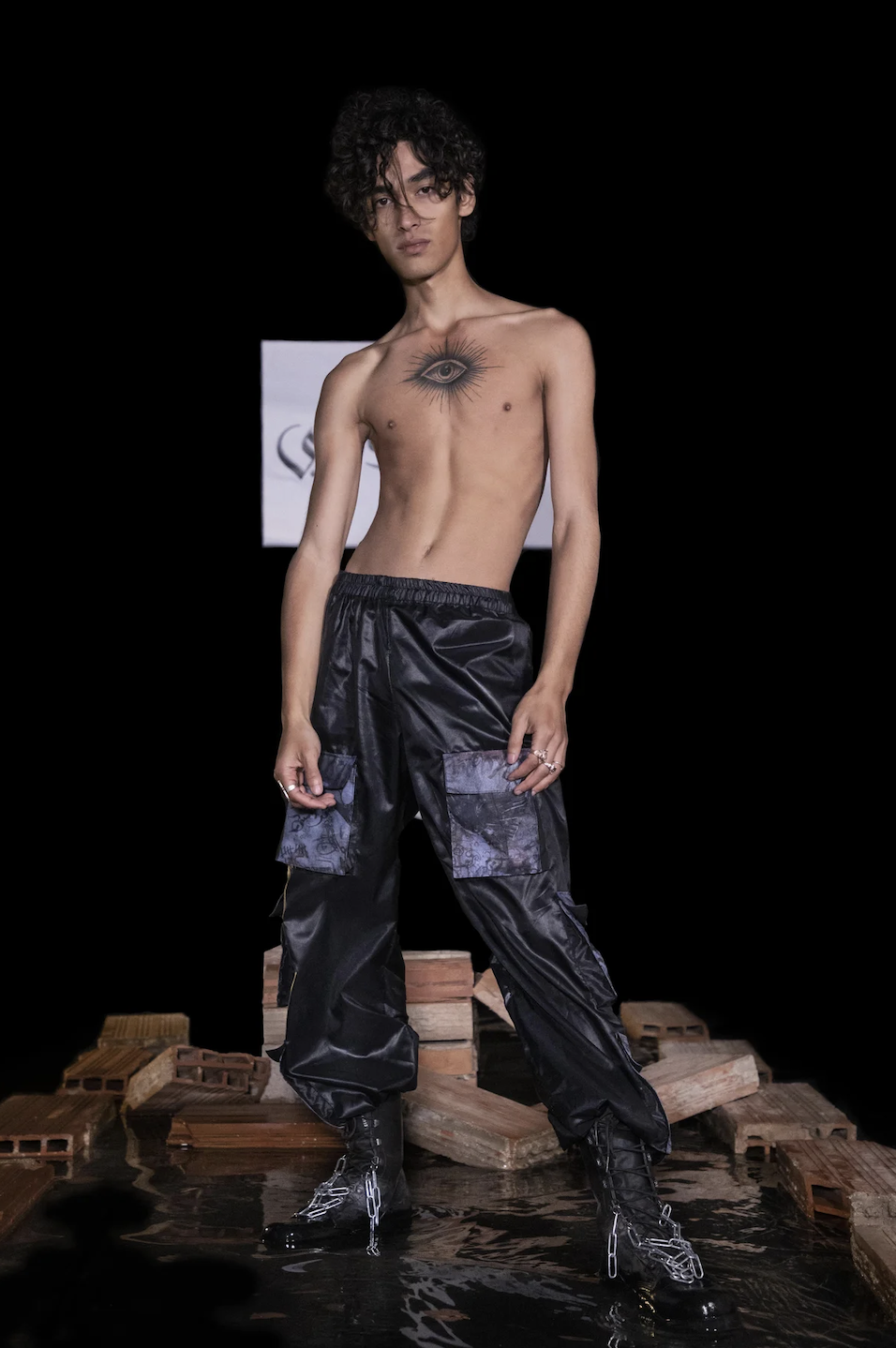
“We sample our collections digitally before going into production; we’re able to see the way the garments would move digitally and reduce sampling fabric waste at the same time,” Braika shares. “With all the restrictions around us as Palestinians, we’ve used the internet to our benefit since we launched.”
Fashion weeks featuring fittings, runways, and overcrowded seating arrangements had been postponed due to COVID-19. While those extravagances have been put on hold for the foreseeable future, there have been achievements in the digital realm. Cyber Fashion Week, a full-fledged week that only lives online, has developed. Additionally, it’s not just designers who publish their look books online: Users can instead explore a global selection of apparel designed for and shown in digital spaces.
Cyber Fashion Week features a diverse selection of shows. While the young Tunisian digital artist Patshuro takes his bulky and busty world of avatars in bodysuits to the frontline on Instagram, Hushidar Mortezaie, an Iranian artist residing in Los Angeles, gives the audience a 360-degree view of his apparel and art.

“It’s interesting to me that while international fashion brands are navigating the restraints of working and presenting their work, this has been the norm for Palestinian fashion creatives long before COVID-19 ever came around,” says founder Yasmeen Mjalli.
After the start of Cyber Fashion Week was cancelled. Lawrence and Braika made the decision to engage in online activities after considering their possibilities. Lawrence adds, “We were thinking that the alternative was to create this platform for designers and others who were affected by the same exact thing [COVID-19] and had restrictions put on creativity.”
Late in March of 2021, the pair started to formulate plans and reach out to collaborators they had worked with previously. Their plan consisted of having to travel across every time zone within that week. The pair sourced designers from Iran, Jordan, New York, London, Hong Kong, and more. To examine how their works may fit in the digital environment and coordinate with Cyber Fashion Week, the duo worked together and engaged with designers and artists during the planning process.
The project began on May 25, 2021, and ran for six days with two designers and one musician performing each day. The pair also incorporated after-parties, one of which featured a DJ set by the Russian protest collective P*ssy Riot, to truly capture the essence of Fashion Week.
One of the 12 designers who took part in the first CFW, Christina Tadros, whose tops incorporate images meant to generate discussion, remarks, “By wearing one of my T-shirts, people will ask, ‘What does this mean?’” “The aim is to heal and reconcile colonial attitudes in the Arab world, and to dismantle the Western dogma toward Arabs. It’s difficult to reach the masses when you say: ‘Hi, I wrote an essay about socio-political issues in the Arab world, please read it.’ But when people wear a T-shirt, it’s present in that time and space. To me, creating a fashion item felt like the smartest way to spark change in any community.”
Lawrence and Braika realized that Cyber Fashion Week had provided a large platform for both their business and other brands. It had mostly assisted brands in showcasing their collections who were unable to do so due to the lack of a physical Fashion Week. Before the pandemic, a physical store launch for a Dubai-based shoe company, Thaely, which uses recycled plastic bags to create a vegan sneaker, was expected. When the launch was cancelled, Thaely showed the shoe on the Cyber Fashion Week platform utilizing a virtual reality filter, allowing viewers to see an accurate recreation of the shoe across all angles.
Aside from the physical shows, the nature of Cyber Fashion Week also prompted designers to reconsider the message they want to convey and the channel through which they want to do so. In this digital environment, their brand statements diverged significantly from the typically emailed press release. Consider the Jordanian T-shirt company Elvaux by Christina Tadros, which presented its narrative in a surreal manner. The label seeks to explore and research the history of the Levant and tackles the substantial subject of colonialism in the Levantine territories. Tadros worked with her sister Solenne Tadros, an augmented reality artist, to tell Elvaux’s tale for Cyber Fashion Week in a more captivating way. As a result, Tadros’s T-shirts now feature a psychedelic analysis of the Orientalist paintings by French artist Jean-Léon Gérôme.
Trashy Clothing itself put on one of the most impressive presentations, using the platform to display items from its autumn collection amongst other garments. After using Braika’s 3D models to create two distinct exhibitions, the company asked customers who had purchased items from the company to upload scans of themselves using the Display.land program. (According to Lawrence, it took them around 10 minutes to pose with their arms and legs extended in order to be completely scanned.) They then had the opportunity to involve the audience in a virtual Trashy Clothing show. That way, Lawrence and Braika were able to interact with customers more through the idea.
“At the end of the day, we create our garments and accessories for our customers. They are our real-life models wearing our pieces in their daily lives. We have to honour them—they’re our muse!” Lawerence said later in an email. “A lot of the customers were amazed at how their scanned files turned into animated virtual models; we received a lot of love and even more questions.”
Cyber Fashion Week is a continuing event, much like any other Fashion Week. It will be released three times a year in January, May, and September, according to Lawrence and Braika. The team wants to invite additional fashion designers, performers, and artists to join in the upcoming Cyber Fashion Weeks. According to Lawrence, “We can save time and give opportunities to people who can’t travel abroad to work,” “This can be part of the future of fashion. Especially this year, this was about ways that we could collaborate as creatives together.”
The creatives in the Middle East continue creating, despite the work that is done frequently going unrecognized. There is genuine hope that events like CFW will continue to elevate the prominence of the region’s creatives—those striving for global attention until a truer reality of life in the region is understood—despite what seems to be an ever-present backdrop of political turmoil.
The company has since returned with a fresh spring 2022 line. Trashy Clothing continues to explore colonialism in textile form, demonstrating how some cultural practices can serve as appendages of occupation. Like its earlier offerings, the current capsule is similarly constructed.
Each piece, which draws heavily on Rebecca L. Stein’s works on the Palestinian hardships, aims to draw attention to the numerous daily struggles that the Palestinian people face as well as the ways in which the settler-state has used leisure and tourism to maintain its dominance and advance further into the occupied territories.
“As Palestinians, our homes and lands that we’ve been ethnically cleansed from have been turned into tourist destination spots by the occupation. Tourism has functioned as a political alibi that actively censored scenes of military violence.” The founders, Omar Braika and Shukri Laurence, told MILLE. “With this collection, we wanted to expand on how colonialism stripped the context of violence into travel & leisure by designing the collection with the same mindset.”
The collection refers back to the earlier topic in all of its manifestations. Items like the Inspection Pocket pants, Settler Sun Tan shirt and Stolen Souvenirs Skirt are introduced in “Souvenirs Of Conquest: Visit To Colonize!” that are not only stylish but unmistakably reminiscent of the horrifying circumstances occurring on the beleaguered piece of land.
Each item, from T-shirts and trousers to dresses and hats, is not only expertly thought out and created, but it also conveys a powerful message to customers. It acts as a sartorial reminder of the lengths to which occupying forces will go in order to assert their power, confirm their control, and blind media by transforming the landscape of war and its aftermath into colloquial expressions.

Tala is an Editorial Intern at Liminul. She’s a creative writer/director, graphic designer, and event coordinated based in Toronto. Tala is a third year student majoring in Fashion Communications at X University.

